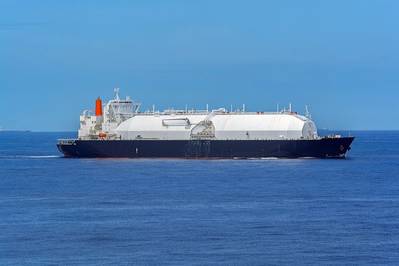Greece's Sole LNG Terminal Ramps Up Imports to Replace Russian Gas
Greece has cut Russian gas imports by more than half this year thanks to increased deliveries from other producers to its sole liquefied natural gas (LNG) terminal near Athens, the country's gas grid operator said on Thursday.
Greece has relied on Russia for about 40% of its gas needs for years but it has ramped up LNG purchases from other countries in line with a European Union plan to cut dependence on Russian energy. It has been receiving Russian gas via the Turkstream pipeline which also delivers to Hungary via Serbia.
Its LNG facility on the Revithoussa islet, 25 miles (40 kms) from Athens, can store 225,000 cubic meters of gas and regasify 1,400 cubic meters per hour.
It is attracting growing interest from domestic and regional importers and has played a pivotal role in Greece's energy strategy and its efforts to boost security of supplies ahead of winter, Maria Rita Galli, the chief executive of the Greek gas grid operator DESFA told Reuters.
"In the context of the energy crisis, Revithoussa is the import infrastructure, the import terminal that is enabling different sources of supply, different sources of LNG to reach the Greek gas market," Galli said.
"Already this year, having maximized the use of Revithoussa, we have seen the import of gas from Russia dropping from 40% to less than 20%".
With increased demand for LNG across the world, cargoes arriving in Revithoussa have doubled year-on-year.
Greek exports
Bulgaria has also been importing LNG through the terminal after being cut off from Russian supplies following its refusal to pay in roubles.
Speaking at an energy conference in Bucharest on Thursday, Greek Energy Minister Kostas Skrekas said his country had exported 2 billion cubic meters (bcm) of natural gas to Bulgaria and neighboring countries so far this year, up from 0.7 bcm in 2021. Read full story
"There is a growing interest. We have many interested parties looking at booking slots in the terminal," Galli said.
"In October, we will run the auction for 2023... and we do expect strong interest from national and international players."
Nearly two-thirds of 6.5 bcm of gas that Greece consumes annually is used for electricity generation.
Like other European countries, it has grappled with soaring energy prices and has spent some 9 billion euros ($8.85 billion) since last year to subsidies power bills for households and businesses.
To cope with the sky-rocketing cost and minimize the risk of gas shortages in the event Moscow cuts flows, the country has reopened some coal-fired plants and is ready to switch some gas-fired stations to diesel.
In July, DESFA leased a vessel or a so-called floating storage unit (FSU), which is moored close to Revithoussa and can boost its storage capacity by an additional 145,000 cubic meters of gas, if needed.
The vessel is expected to remain there until the end of 2023, while DESFA is looking into a permanent solution that would involve the purchase of a vessel that could be connected to Revithoussa with a pipeline, Galli said.
"If we didn't have Revithoussa today, we would be like other central Balkan countries, totally reliant on imports of Russian gas," she said.
($1 = 1.0170 euros)
(Reuters - Additional reporting by Vassilis Triandafyllou; Editing by Emelia Sithole-Matarise)











